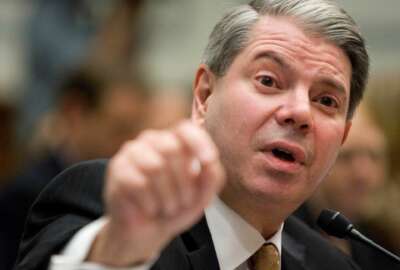
‘Culture of evidence’ should be preserved as government prepares for new administration
As the government prepares for another presidential transition, administration officials say it's important to build on the progress that's been made on agency...
Access to data and government transparency have built a “culture of evidence” that should not just be sustained during the presidential transition, but also continually promoted for federal accountability.
David Mader, controller at the Office of Management and Budget, said there’s been an emphasis on two things during the Obama administration.
“One is the access to data, both within the government — across government agencies into the public — and also the transparency … and the fact that in May of 2017 we’re going to be able for once now, to be able to demonstrate both inside the government and externally to the public, where those tax dollars go in any given year, whether it’s in contracts, whether it’s in loans, whether it’s in salaries and expenses, internal operations or financial assistance,” said Mader during an April 5 National Academy of Public Administration forum in Washington. “And I think that over the last several years what we have been pushing at OMB and the administration is building a culture of evidence, and what I mean by evidence is being able to say to ourselves and to the elected officials and to you the citizens, that this program was successful.”
But Comptroller General of the United States Gene Dodaro said the government must address four management areas if it wants to improve accountability: Leveraging technology, managing finances, adapting to change and building a workforce to carry out those responsibilities.
“There’s consistent breakdowns in the lack of discipline and management on IT investments across government,” Dodaro said. “As a result, the federal government’s not getting the return it needs to get in order to improve its performance and improve its interaction with the public using technology. OMB has tried a number of approaches that we think have a lot of promise: TechStat, PortfolioStat, IT dashboards, but these all need to have better information and [be] more consistently applied across the federal government.”
Adapting to change is also something where the government has struggled, Dodaro said, pointing to examples like the need to address the global food and drug marketplace, as well as failing to fully implement financial reforms related to the recession.
Managing its finances and workforce are the other two focus areas the government needs to address when it comes to accountability, Dodaro said.
Dodaro said it is critical that the government “make every dollar count” in this budget environment, and one way to do that is through the Digital Accountability and Transparency (DATA) Act, which requires the government to standardize all of its financial information so that it can be analyzed across contracts, programs and agencies.
The DATA Act is still in its early stages, Dodaro said, with the expectation of reports being made available in calendar year 2017, but if it is implemented effectively, “I think it’ll have fundamental improvements in accountability in the government and transparency over how the money is being spent.”
Mader said while agencies are making investments in accountability, it’s important to know when an investment is successful — or set up a way to start thinking about that success.
“What we’ve been installing in each of the departments and agencies is sort of that thought process of how do you set the baseline, how do you measure success going forward and how do we then hold ourselves accountable for the investments that we’re making,” Mader said.
Risk, reward, review
During the forum, Mader shared that the administration was “probably within 60 days” of rolling out updated procedures on internal controls, which will include a requirement that each cabinet-level department establishes a formalized enterprise risk management program.
Twenty-five years ago under the Chief Financial Officers Act, those offices did a good job of implementing financial internal controls, but over those decades “we’ve actually narrowed the aperture on how we apply internal controls and risk, just to pretty much the CFO community,” Mader said. “So what we’re gonna do in this new release of this new circular is to actually open that aperture up again and say this is not just about the CFO, this is about every program.”
Both men also shared their advice for the transitioning of administrations.
Mader said it’s important for the incoming administration to not just automatically disregard the progress that’s been made by the previous administration.
“At least assess it and make your own judgment,” Mader said. “I don’t think it make sense to start all over again in some of these programs.”
Dodaro said his agency also has a roll to provide advice to an incoming administration on management issues and challenges and risk that they take on.
“The last time when the Obama administration came in … two days after the president-elect was designated, we published a website showing all the major management challenges by agency, department, cross-cutting issues, things that were working well and things that needed to be improved. We will do that for the next administration. And we’re working on an app that can be used to focus on high-priority GAO recommendations that are still open, to be addressed as well,” Dodaro said. “There’s a lot of things going on in the world these days, we haven’t touched upon the global dynamics at play. It’s really important to have a very stable, smooth, seamless transition as much as possible in this. Hopefully this administration will continue that activity in helping the next administration go forward.”
Copyright © 2024 Federal News Network. All rights reserved. This website is not intended for users located within the European Economic Area.
Related Stories




